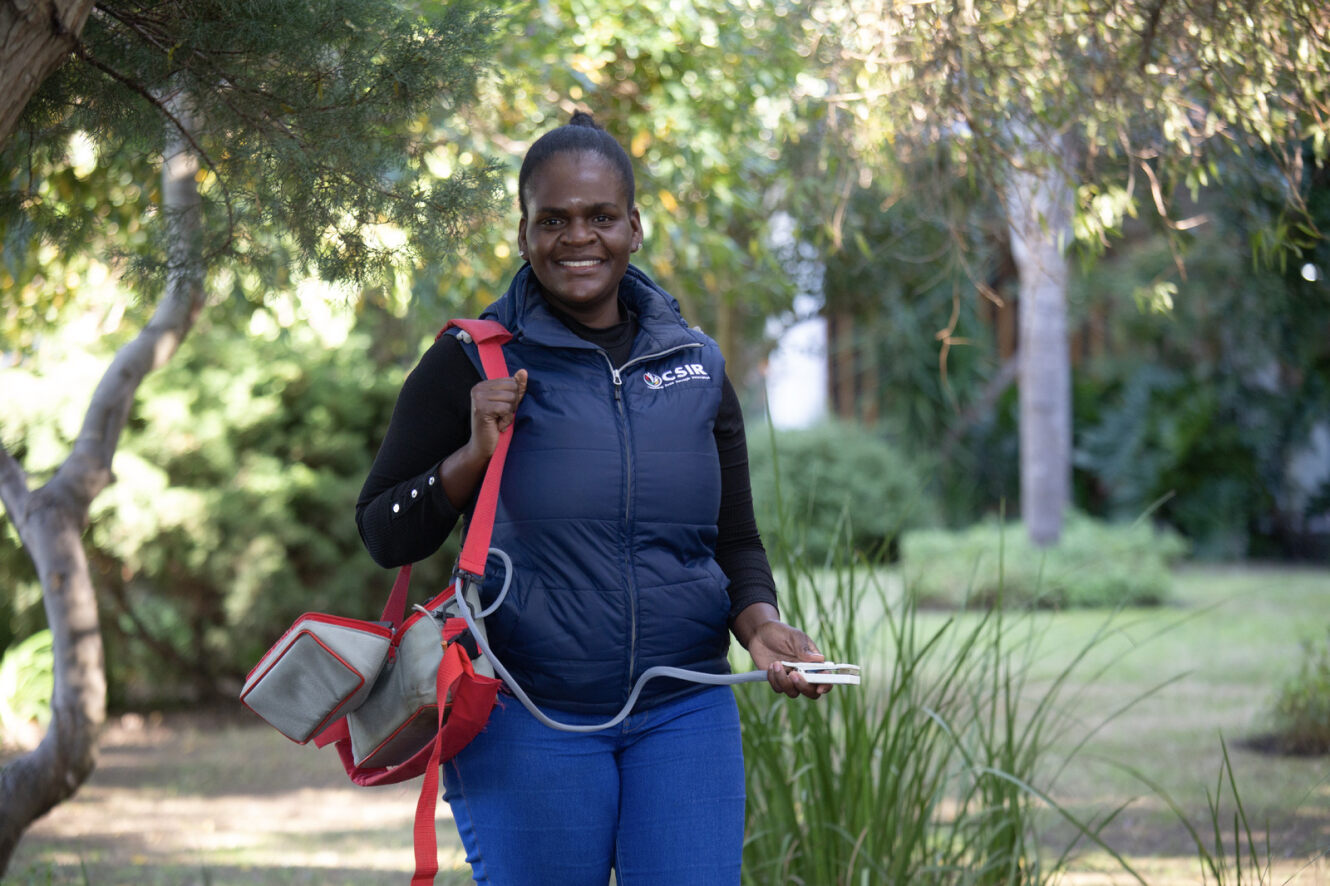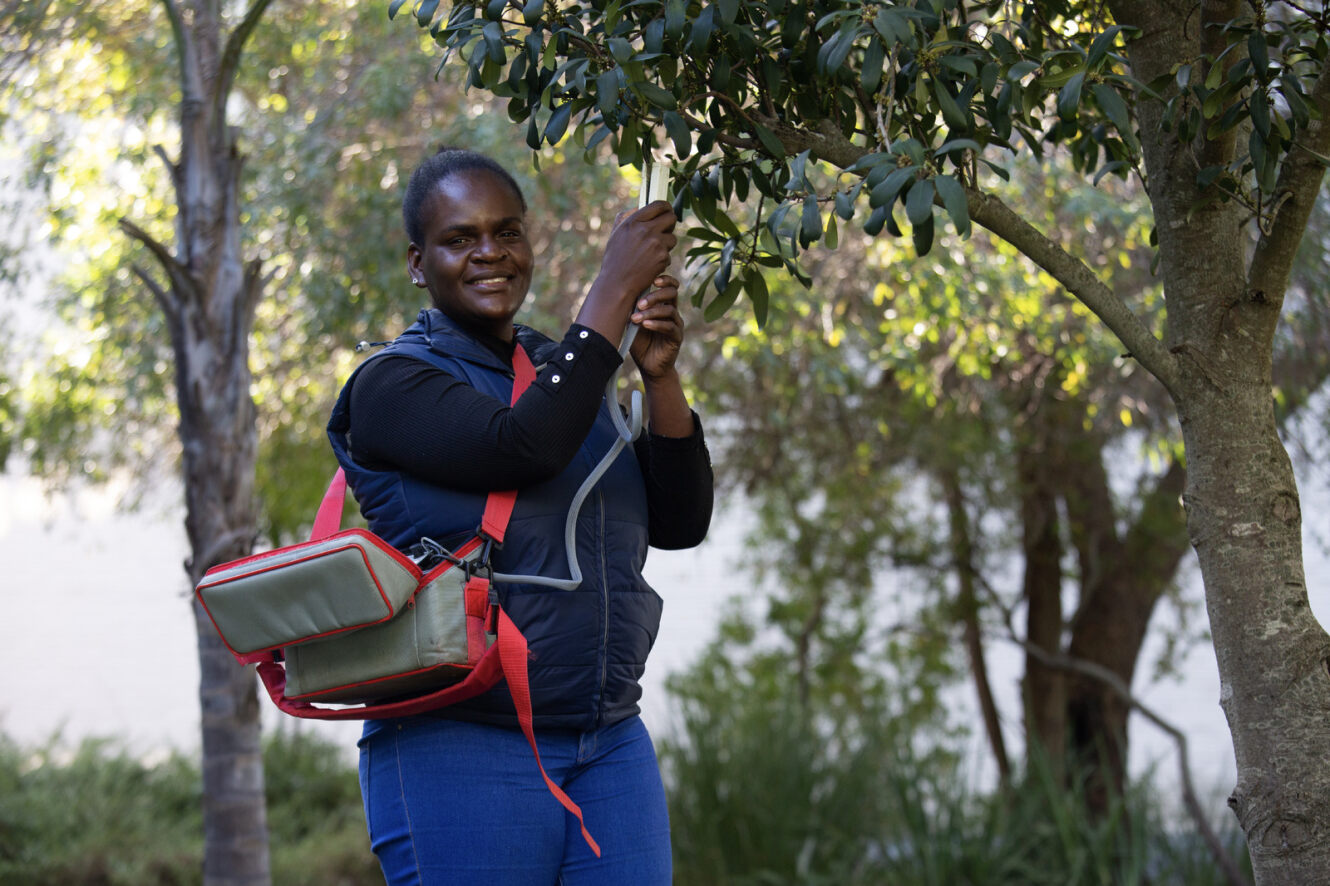Producing a full harvest thanks to water research, technology and innovation
Meet Dr Nompumelelo Mobe
Dr Nompumelelo Mobe’s research focuses on water conservation in agriculture and the water use for crops – also known as agricultural water management. Few understand the significance of access to water as well as Mpumi does. She hails from a small village in Limpopo called Botlokwa, a village north of the city of Polokwane. This is where she first experienced the importance of access to water.
Enduring the hardship of travelling far distances to fetch water from the nearest river or to purchase water when money was available, was a daily reality. “To make matters worse, access to water meant that labour was required, such as needing to cover long distances with one’s wheelbarrow or having to carry a bucket and asking neighbours to assist to reach the nearest river,” she says. “Even in contemporary times, for rural households to have direct access to water requires having a borehole to access groundwater. Accessing water in rural areas is no small feat,” she says.
The need for novel water conservation technologies for farming
Irrigated agriculture uses 70% of the world’s fresh water and yet Mobe feels that the importance of water and water conservation technologies in agricultural production processes is overlooked. "New emerging topics such as climate change and the use of pesticides in agriculture processes tend to be given more exposure and priority in research,” she says.

to measure water use in plants.
When she was a student, the content she was exposed to (up to Master's level) tended to lay more importance and focus on the production aspects of agriculture as it relates to food security. Mobe registered for a BSc in agriculture at Limpopo University in 2010, majoring in agronomy. She completed her MSc in agriculture in 2016, which led to an internship at the University of Venda in April 2016. She was a successful recipient of a CSIR Professional Development Programme Doctoral Studentship in 2016, and joined the CSIR the following year. This was when she realised that she wanted to specialise in water-related research. During this time, she made use of the opportunity to complete her doctorate in environmental and water science at the University of the Western Cape in 2020, which was conferred on her in May 2021.
Conserving water and farming wiser for the future
Mobe’s research informs and assists farmers in quantifying the amount of water needed to compensate for the loss to the atmosphere. Because crop production and the management of natural resources are intertwined, she actively leads research activities with diverse stakeholders, including government and farmers, on how to use water in a sustainable manner for improved access and availability of water resources.
Needed: Women working for water conservation in agriculture
Mobe describes her experience as being part of a predominantly women-led water research team as a fantastic experience. “Our regional team is equipped with a range of different educational and academic backgrounds. This allows all of us to contribute in specialised and meaningful ways. We are learning a lot from each other, which has been fantastic,” she says.

She believes that more can be done to empower female scientists in water research and that there is room for improved representation and empowerment of women scientists in this field. She is as passionate about increasing awareness on the importance and value of water in agriculture as a subject matter at tertiary education level, as she is about ensuring that women researchers are represented in this unique area of research.
When apple orchards boomed during a water shortage
“New scientific and technological approaches to water use and reuse, treatment and management are urgently needed,” Mobe says. This requires research into many areas. The CSIR contributes to the provision of reliable, efficient and functional water and wastewater service delivery in the interest of economic development, through the development and refinement of smart water use and infrastructure technologies for the public and private sectors.
To illustrate the point, Mobe shares a real-life example that affected many. “From 2016 to 2017, when the Western Cape was facing a possible drought, freshwater dams had dropped below 25% of capacity, and levels continued to fall. Stakeholders and the government approached the CSIR for advice and input on how to address and tackle the water scarcity problem. The CSIR managed to secure Water Research Commission funding for a project that focused on the use of water in the production of apples. Locally, most apples are produced under irrigation in the Western Cape,” she says.
Due to the water restrictions at the time, farmers were concerned about the apple industry and how production processes would be affected, since South Africa is ranked as the eighth largest exporter of fresh apples in the world. “Because the CSIR was able to assist, the deciduous fruit industry leaders were more than willing to supplement the funding from the Water Research Commission. The CSIR assisted the deciduous fruit industry with decisions relating to its limited water and how to use water as a resource in a sustainable way. “There was no running out of water despite the looming ‘Day Zero’ at the time, because water was managed and saved,” she says.
“Different sectors need water, not just the agriculture sector, and often industry approaches the CSIR to assist,” she says.
Computer science increasingly serving water research
Modern agriculture faces many complex challenges and managing water use in farming practices is a crucial aspect of successful farming. Needing to do more with less water will require a multitude of skills sets, one of which is software development. Mobe feels it is a career that would serve water research well.
“As researchers, we gather the data and produce reports that capture our findings for our various clients to use. But there is room to do more with the available data. There is more value that can be created from the data, as well as from the data sets in the archives. The data gathered can be used to create technologies and spark innovation, and we need software developers that can develop software to predict water use or the quality of water in South Africa.” Similarly, computer scientists can add value by transforming the agricultural sector through the use of internet of things technologies. This technology can play a role in assessing the water requirements and time of supply of crops.
Reaping the rewards
“I enjoy my career at the CSIR. I enjoy being in the field and doing fieldwork. Assembling the equipment and erecting the study area creates a sense of anticipation for incoming results. Being able to advise farmers about water and assisting them with related decisions fulfils me. It is extremely rewarding to experience how much the farmers look up to water researchers at the CSIR. Knowing how much we are able to help them brings me a lot of personal satisfaction.”



